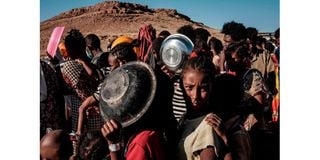Why Ethiopia's peace deal is good news for women, girls

Ethiopian children who fled the Tigray conflict wait for food aid at a refugee camp.
What you need to know:
- The warring parties will “silence guns in principle” and work on ending the war “without delay”.
- The signing came after 10 days of AU’s intense negotiations led by former Nigerian President Olusegun Obasanjo and his Kenyan counterpart Uhuru Kenyatta.
Women and girls are the biggest beneficiaries of a fresh peace deal signed by the Ethiopian government and rival Tigray People's Liberation Front (TPLF) forces.
Last week, the Ethiopian government and TPLF, which controls the northern Tigray region, signed a “permanent cessation of hostilities” deal to end one of Africa's recent bloodiest civil wars. Women and girls have been the major casualties of the conflict that broke out in November 2020 in northern Ethiopia.
According to the agreement, the warring parties will “silence guns in principle” and work on ending the war “without delay”. The signing – hailed by many people across the world – came after 10 days of African Union’s intense negotiations led by former Nigerian President Olusegun Obasanjo and his Kenyan counterpart Uhuru Kenyatta.
Women and children have heaved a sigh of relief. The atrocities committed against them as a result of the conflict saw Ms Filsan Abdi, the first Somali Ethiopian minister, resign from the Women, Children and Youth docket at the height of the war last year, citing the government’s failure to hold perpetrators of war crimes, including mass rape, to account. To date, she remains the only senior official to resign in protest over the conflict.
Commission’s findings
According to the Commission of Human Rights Experts on Ethiopia, led by Kenyan lawyer Betty Murungi, women and girls have been enduring horrific crimes, including rape, defilement, and other forms of sexual and gender-based violence. Last month, the commission, in its report to the UN Security Council, lifted the lid off the atrocities. Its probe showed that rape and other crimes of sexual violence had been perpetrated on a “staggering scale” since the conflict began.
Commissioner Radhika Coomaraswamy said they only uncovered “the tip of the iceberg” in their probe. “Survivors being targeted as a reprisal for rape of Tigrayan women and girls shows how unchecked violence and hatred only sows further division and perpetuates cycles of abuse,” she said, adding that violations and abuses show that atrocities do not occur in a vacuum, and are directly linked to ethnically motivated hate speech and hostility.
Ms Murungi termed the humanitarian crisis shocking – both in terms of scale and duration. She noted the devastating impact of widespread denial and obstruction of access to basic services, food, healthcare, and humanitarian assistance on civilian populations, saying they have reasonable grounds to believe that it amounts to a crime against humanity.
“The Ethiopian government should immediately restore basic services, and ensure full and unfettered humanitarian access. Tigrayan forces should ensure that humanitarian agencies are able to operate without impediment,” Ms Murungi added.
Law professor Steven Ratner, also a member of the commission, revealed that they also conducted preliminary investigations into several other large-scale killings, concluding that further investigations are needed.
A welcome move
A section of global and rights organisations has welcomed the peace agreement, terming it a step in the right direction. UN Secretary-General Antonio Guterres commended the parties and the mediators for the milestone.
“It is a critical first step that paves the way for the unimpeded delivery of lifesaving humanitarian aid and the resumption of public services,” he told reporters last Thursday at the UN headquarters.
He said the human cost of the conflict has been “devastating”, and urged all Ethiopians to seize the opportunity for peace, pledging UN’s full support.
US Secretary of State Antony Blinken “welcomed the signing of a cessation of hostilities” in a Twitter post last Wednesday, praising the AU for “its extraordinary efforts to bring peace to northern Ethiopia”.
The Non-Governmental Organisations Council of Kenya, in a statement, commended the parties for taking the initial step of agreeing to end the hostilities and continue dialogue to resolve outstanding issues, consolidate peace and end the conflict.
“We further welcome the delivery of humanitarian assistance and the protection of local civilians through the agreement and strongly commend the [Kenyan] government for the support they have accorded the peace talks through former President Uhuru Kenyatta,” said Stephen Cheboi, the council’s chairperson.
Rights groups’ voices
The UN Human Rights Council last December formed the Murungi-led commission to probe human rights violations due to the conflict. It says Tigrayan women and girls were being targeted with violence and brutality by Ethiopian and Eritrean forces, as well as regional militias. Other members of the team include former International Criminal Court Chief Prosecutor Fatou Bensouda.
In May last year, rights organisations called for an immediate inquiry into the allegations of violations of women’s and girls’ rights, including sexual violence. The Solidarity for African Women’s Rights (Soawr), a coalition of over 60 organisations working on women’s rights in 32 countries in Africa, noted that reports of sexual violence against women and girls in Tigray needed to be acted upon urgently.
It emphasised the need for the inquiry to extend to violations and atrocities committed by all parties, including Eritrean forces, and called for the prosecution of those found culpable under the international criminal law. The coalition also demanded that local authorities put in place measures that protect women and girls from rape and sexual assault in line with Ethiopia’s human rights obligations.
“The horrendous survivor accounts from the Tigray region of sexual abuse of civilians only serve to confirm that there is nothing inevitable about this brutal state of affairs. We, therefore, invoke the African Commission on Human and Peoples' Rights mandate to protect the rights of the women in the country,” the Soawr statement read.
Ethiopia is a signatory to several international and regional human rights treaties, including the Maputo Protocol.





